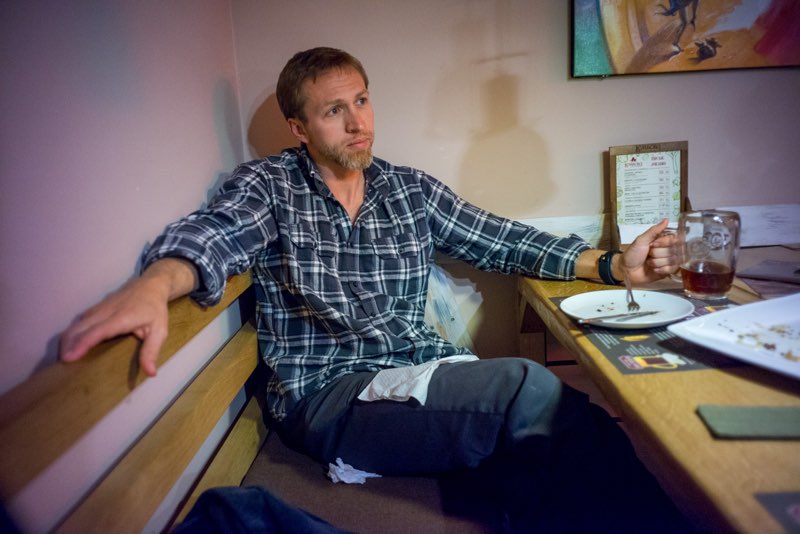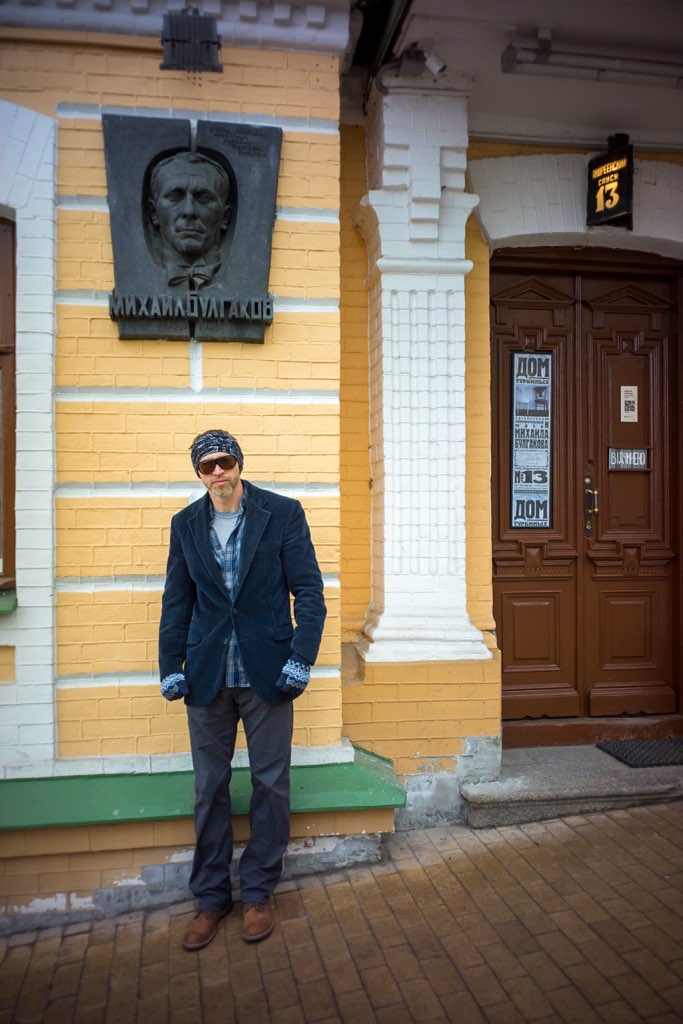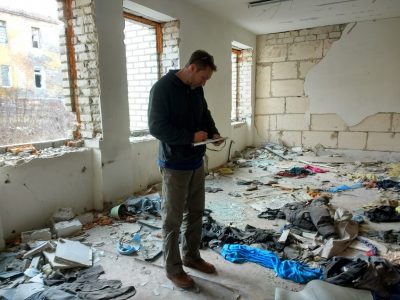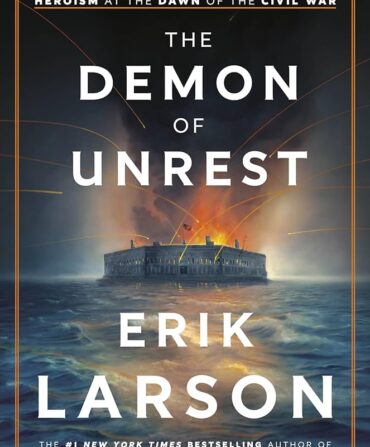In the spring of 2017, passing through a checkpoint in eastern Ukraine, the car I was traveling in was waved onto the shoulder of the gravel road past the burn barrels and sandbag emplacements. You might have recognized the men doing the waving from films about narco-traffickers or terrorists. They wore the black facemasks with the eye and mouth holes cut out. They carried their Kalashnikovs slung low on their hips. When one tapped his barrel against my window, the sound was an impossibly dull thud.
I was in the back seat beside a photographer friend, my press credentials stuffed hastily beneath the seat at the insistence of our driver. Up front was another friend, a Russian studies professor who was living at the time in Kyiv. He jumped out of the car and had the good sense to listen. Were these pro-Russian separatists or pro-Ukrainian militiamen? It mattered. Thankfully my friend spoke both Russian and Ukrainian, and whatever he said worked. A few minutes later we rolled past the checkpoint. I reached beneath my seat to retrieve my now-crumpled press credentials and bending forward paused for a moment to release the breath I hadn’t realized I was holding. Here I was, a Southern boy, who was once again a long way from home.

By that time I had been making forays into Eastern Europe for nearly fifteen years. My wife and I both grew up in rural South Carolina, but in 2004 we were living something of a dream. I was teaching fiction writing at the College of Charleston while we lived in the third-floor apartment of an antebellum mansion on Limehouse Street, along the original Battery. We walked everywhere. I could hardly imagine why one would leave the city. But that year I received both a writing grant and a fellowship to a playwriting program in Prague. We realized we could just go. My wife quit her job, I left my pickup in my parents’ garage, and we flew to Berlin, where we proceeded to make our meandering way south and then east, and then east some more. At the urging of a friend who had grown up in Košice in eastern Slovakia, we found ourselves veering wide of the usual tourist route. Eventually we did make our way to Prague, but it was Eastern Europe that had sank its hooks into us.
In hindsight, I think it was because it reminded us so much of the rural South we both knew. Prague and Budapest might be castles and cobblestones, but the villages of Eastern Europe were so much like small Southern towns. The big families gathered for Sunday dinner, the gossip, the eccentric aunts. Everyone your cousin. I remember the Romanian woman who refused to drive the right way up a one-way street. She put one finger to her very rouged cheeks and shook her head sadly. It had been the other way when she was a girl, and who was the city to change such a thing? I remember a giant meal in the home of our Slovakian friend Maros’s parents, course after course, urged on us by his doting mother—so much food I nearly fell asleep driving home in our borrowed Skoda.

We kept going back, and in 2014 found ourselves living in Slovakia with our young children, adjacent to Ukraine. At the time, I knew almost nothing about what was happening in that former Soviet possession. I knew vaguely there had been a revolution that had overthrown the pro-Russian government, and that in the distant east the Ukrainian army was at war with pro-Russian separatists. But it didn’t touch us. We went to Christmas markets in Poland and swam in the Adriatic. Our son lost his first teeth in an old Communist resort in the Hungarian mountains, catching us off guard so that he had to settle for a five Euro note and a scattering of Croatian Kuna.
But in the end it did touch us—how could it not? Eventually I became obsessed with what was happening in Ukraine and in 2017 was finally able to travel first to Kyiv and then to the eastern regions. I immersed myself in that world and in late 2019, just before we began a stint living in Romania, published a novel about the war. Firebird was a high-octane thriller, a beach read, but a beach read grounded thoroughly in what I had seen and heard and smelled.

Watching the footage from Ukraine now, I began to see it all again. The square in Sloviansk where I’d watched a young boy and girl—brother and sister they must have been—hold hands so they could share a single pair of rollerblades—now I saw grainy cell phone footage of Russian soldiers. The market where old women had sold honey, jars of pressed sunflower oil, and—because I presume it was all she had—a single boot—on CNN that market appeared as rubble. A BBC reporter stood outside the train station in Kyiv interviewing families waiting to board, and I remembered standing in just that spot, backpack slung over my shoulder.
I saw more, too. I saw the young couple married that morning and by the afternoon holding rifles, because the future they had imagined would now have to be fought for. I saw the kindergarten teacher with tears in her eyes and a rifle in her hands. She barely looked at the camera and her voice was no more than a whisper, but it was clear what she said: “I just want to live in my country.” And then there was Volodymyr Zelenskyy, the Jewish comedic actor turned Ukrainian president who, when offered a chance to flee the country said, “I don’t need a ride. I need ammunition.”
There is something naïve, something perhaps reprehensible at romanticizing the suffering of others. But it is also something very human, and I find myself incapable of looking away. I tell myself that watching is a moral duty because what else can I do? Send some of my money, and all of my prayers. I’ve done both. I’ve sent text messages and emails and sat at my keyboard and wept. None of it feels like enough.
It is probably impossible for we Americans to imagine literally defending our homes. You probably can’t imagine it. I know I can’t. Our public life is cynical and partisan and monetized. But if the kindness and resolve of not just the Ukrainian people but all the people I’ve met in Eastern Europe has taught me anything, it is that there is a different way to be in the world, a way of generosity and courage, and this morning, just this once, I prayed not for people fighting in the streets of Kiev or huddling in subway stations in Kharkiv. I prayed for us. I prayed Dear God, for just one day, for just one hour, for just one second, let us know what it feels like to be Ukrainian.
Mark Powell is the author of seven novels and directs the creative writing program at Appalachian State University. His new novel, Lioness, is out this April.








